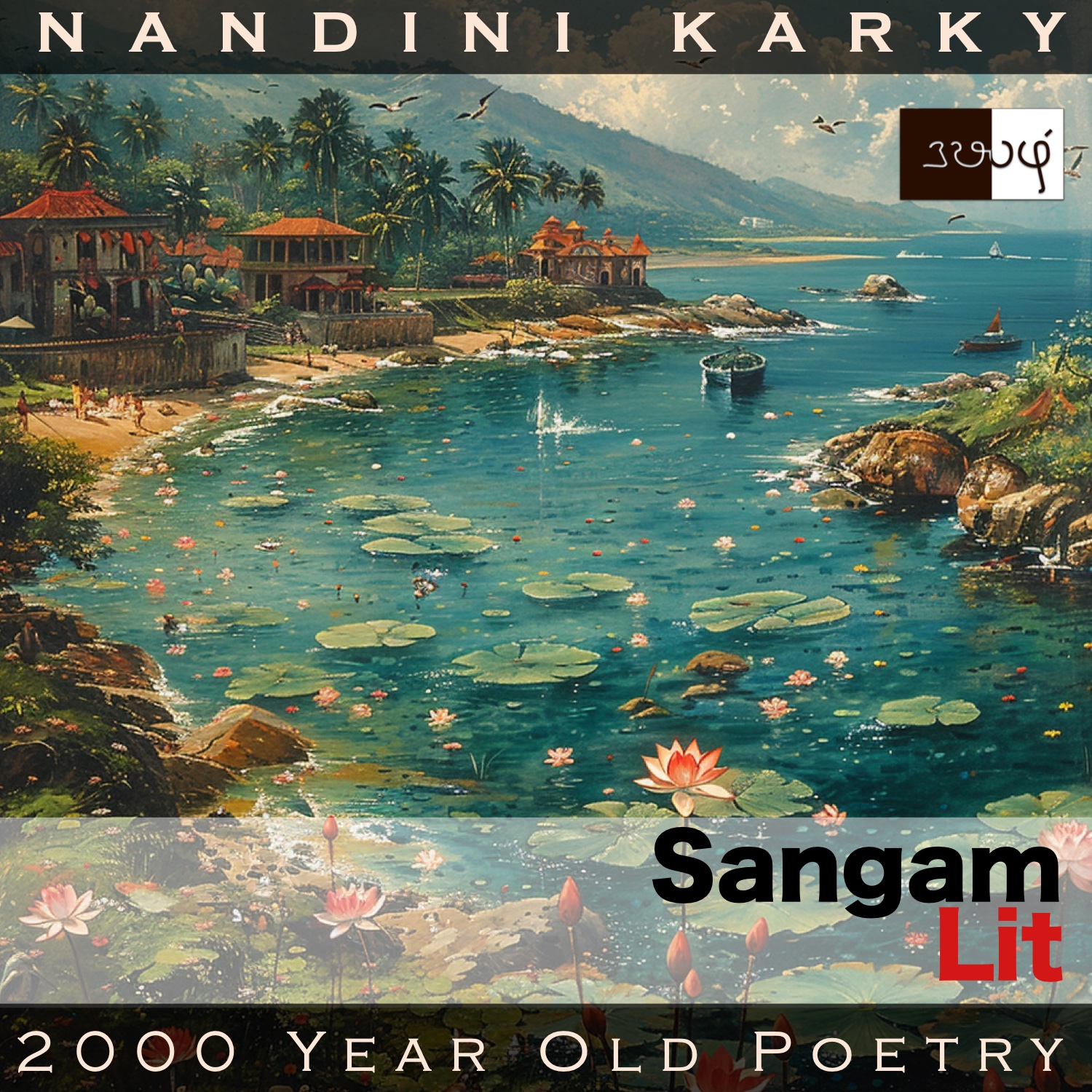Podcast: Play in new window | Download
Subscribe: Apple Podcasts | Spotify | Amazon Music | Android | iHeartRadio | TuneIn | RSS | More
In this episode, we perceive the boundless generosity of a ruler, as portrayed in Sangam Literary work, Puranaanooru 396, penned about the Velir King Vaattraattru Ezhiniyaathan by the poet Mangudi Kizhaar. Set in the category of ‘Paadaan Thinai’ or ‘Praise’, the verse echoes the pride of a supplicant about his patron.

கீழ் நீரான் மீன் வழங்குந்து;
மீ நீரான், கண் அன்ன, மலர் பூக்குந்து;
கழி சுற்றிய விளை கழனி,
அரிப் பறையான் புள் ஓப்புந்து;
நெடுநீர் கூஉம் மணல் தண் கான்
மென் பறையான் புள் இரியுந்து;
நனைக் கள்ளின் மனைக் கோசர்
தீம் தேறல் நறவு மகிழ்ந்து,
தீம் குரவைக் கொளைத் தாங்குந்து;
உள் இலோர்க்கு வலி ஆகுவன்,
கேள் இலோர்க்குக் கேள் ஆகுவன்,
கழுமிய வென் வேல் வேளே,
வள நீர் வாட்டாற்று எழினியாதன்
கிணையேம், பெரும!
கொழுந் தடிய சூடு என்கோ?
வள நனையின் மட்டு என்கோ?
குறு முயலின் நிணம் பெய்தந்த
நறு நெய்ய சோறு என்கோ?
திறந்து மறந்த கூட்டுமுதல்
முகந்து கொள்ளும் உணவு என்கோ?
அன்னவை பல பல
……………………………….. வருந்திய
இரும் பேர் ஒக்கல் அருந்து எஞ்சிய
அளித்து உவப்ப, ஈத்தோன் எந்தை;
எம்மோர் ஆக்கக் கங்குண்டே;
மாரி வானத்து மீன் நாப்பண்,
விரி கதிர வெண் திங்களின்,
விளங்கித் தோன்றுக, அவன் கலங்கா நல் இசை!
யாமும் பிறரும் வாழ்த்த, நாளும்
நிரைசால் நன் கலன் நல்கி,
உரை செலச் சிறக்க, அவன் பாடல்சால் வளனே!
Another long song of praise. The poet’s words can be translated as follows:
“Below the surface of water, schools of fish flow; Above the surface of water, akin to eyes, flowers bloom; In the fields all around the backwaters, by playing on the ‘ari’ drum, birds are chased away; Because of the moist and cold breeze that scatters soft sand near the vast seas, birds with delicate wings call out aloud; Kosars relish sweet, filtered toddy from moist nectar and sing ‘Kuravai’ songs many;
To those who lack strength, he becomes the strength; For those who lack kin, he becomes the kin; He is a leader with a victorious spear, Ezhiniyaathan, who rules over the fertile waters of Vaattraaru, and we are his bards, O lord!
Should I talk about the fleshy pieces of meat? Or about the rich nectar of toddy? Or the ghee-soaking rice mixed with the flesh of small hares? Or about the door of the food storehouse that he opened for us to take from and forgot to close? Much, much more like this…. To my sorrow-filled huge group of kin, more than they could eat, he kept rendering, that great lord of mine!
There is no limit to what he gave to people like me; Amidst the rainy skies and the twinkling stars, akin to the white moon that spreads its rays, may his unfading fame shine radiantly! As I and others like me bless him for the copious shower of fine ornaments, may the treasure of songs that sings his praises flourish and spread his fame for long!”
Let’s explore the details. The poet begins by asking us to take a dip in water to see huge schools of fish swimming down under, and then, he asks us to pop our heads out to catch a glimpse of the fine flowers like the eyes of maidens blooming above. Then, as we step out of the water, he points to the sounds of ‘Ari drums’ resounding and birds fluttering away from the fields. It’s not only humans disturbing the birds, but even nature in the form of cold winds near the shore that seems to be scattering fine sand and making birds with soft wings cry out aloud. From the world outside, the poets moves inside the homes of people called ‘Kosars’ and points out how they are drinking toddy and singing ‘Kuravai’ folk songs and dancing happily. Then, the poet moves on to describe Ezhiniyaathan, the ruler of this land and talks about how whatever people lack, he becomes that to them. If it’s strength, he’s their strength; If what they lack is someone to call kith and kin, the king becomes their kin, says the poet, in this glowing portrait.
Then, in an ecstatic tone, the poet wonders about what he should sing about for there is so much. Should it be about the thick and fleshy pieces of meat or the bowls of toddy or the taste of ghee-soaked rice with the meat of hares or the nature of this king to open out his granary and forget even to close it, after asking these supplicants to go and take whatever they want! More than whatever his kin dreamed of, this king kept offering, says the poet. The poet says you cannot put a limit on what he’s given to people like him, and concludes by wishing the king’s fame shines like the full white moon on a rainy sky and that the number of songs singing his praise keep growing so as to spread his fame forever.
Contrary to this poet’s wish, this is the only song about this Velir King that made it to the collection of Sangam verses. It’s interesting to see the way the poet describes this king’s generosity by portraying him as someone who never said ‘Stop, that’s all I can give you’. It was like he opened out his treasures like a genie and said ‘Take all you can and more’. Is this just an elevated expression of an overjoyed and relieved person at the end of his suffering or is this the truth? Could these Tamil rulers have been so generous so as to not think of themselves in their giving to others? Or perhaps these kings believed that was the only way they could live beyond their mortal years. If we think about it, isn’t it only because of the songs of such euphoric poets, that after two thousand years, we know about these kings and are still reflecting on their acts of limitless generosity?




Share your thoughts...